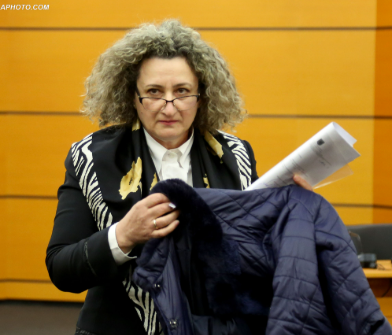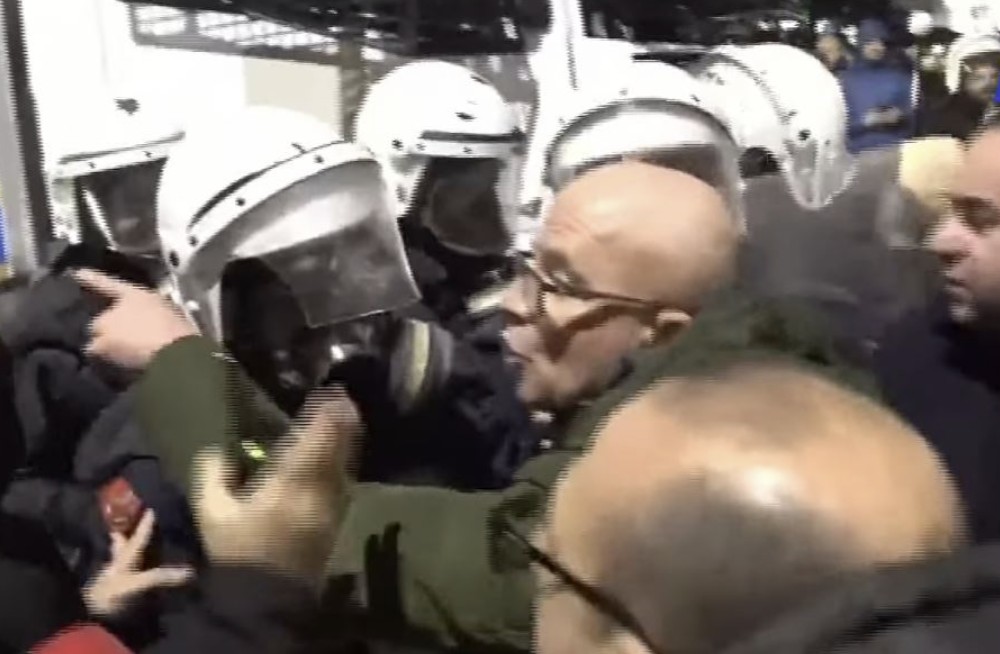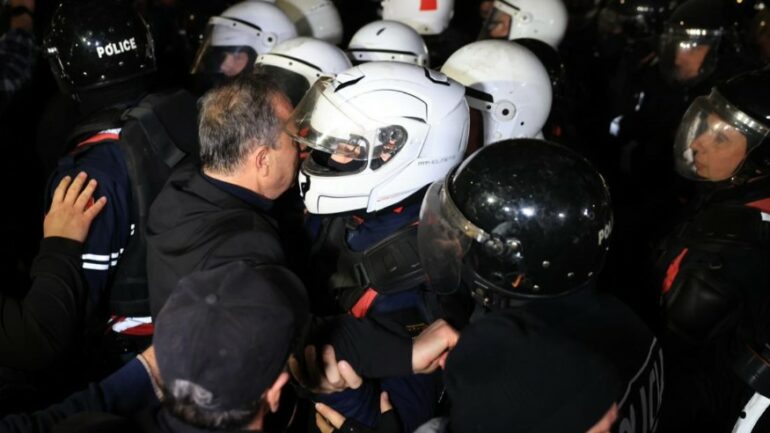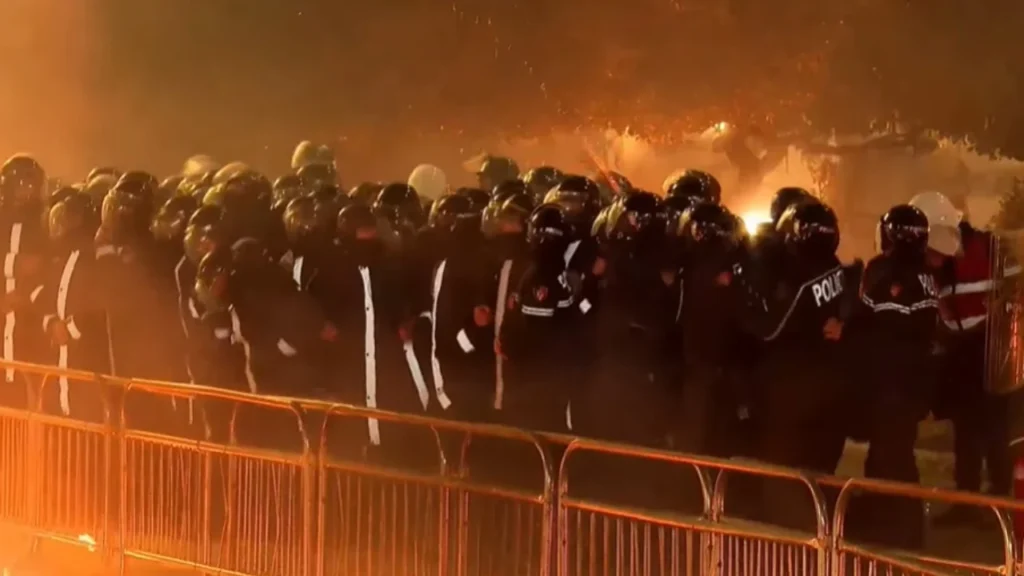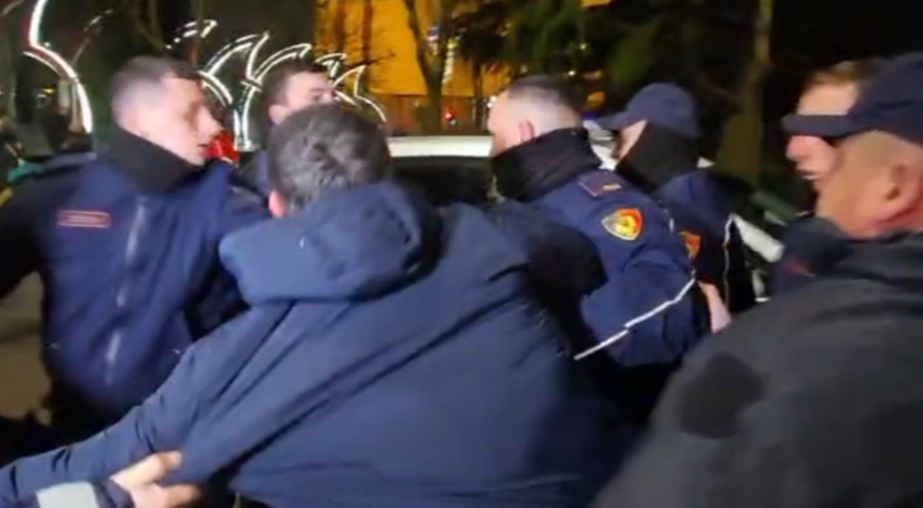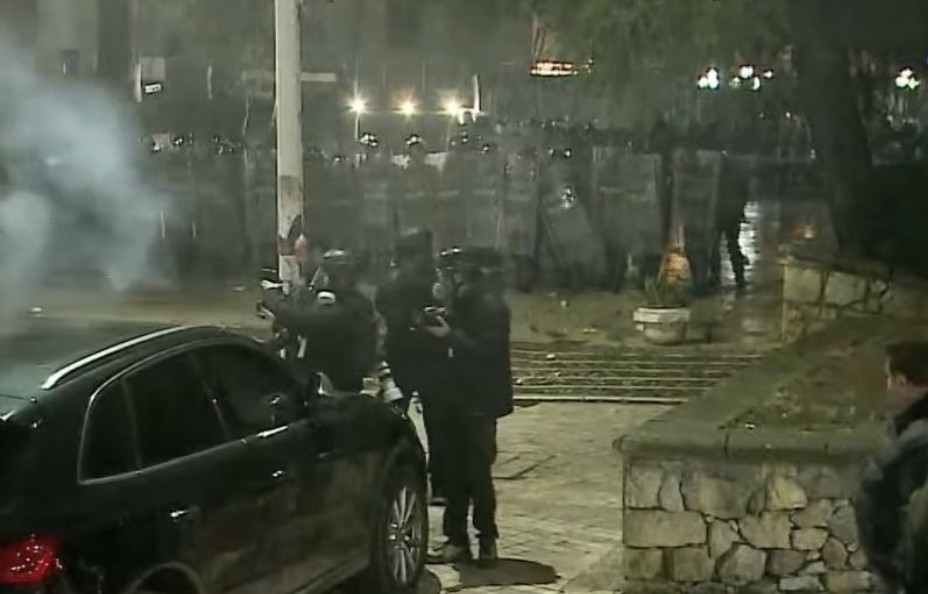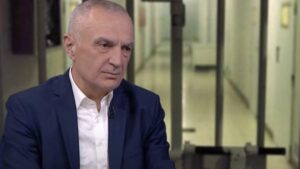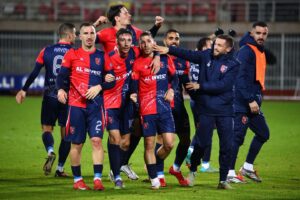Genci Muçaj: Albania enjoys magnificent relations with Turkey

On February 22, 2015, H. Cigdem Yorgancioglu, a Turkish diplomatic columnist, interviewed Mr. Genci Muçaj the Ambassador of Albania to Turkey, in his office in Ankara. Yorgancioglu’s interview was entitled “The Fragrant Oasis of Growing Albania and rising Turkey Today” the goal of her interview was to introduce the society, economy and the cultural life of foreign countries in Turkey, as well as highlight the intersection of mutual relations focused on the cultural, economic, political sectors between Ankara and the World.
The following is an excerpt of the interview with Ambassador Muçaj.
H.Cigdem Yorgancioglu (HCY): Two days ago on Tuesday I was at the reception of the 36th anniversary of the Islamic Republic of Iran that took place at the Anatolian Hall of Swiss Hotel where the Albanian National Day reception has been taking place since 2013. How long have you been in Ankara as the Ambassador of the Republic of Albania in Turkey and as non-resident?
Genci Muçaj (GM): I was nominated by the President of Albania as the Ambassador Extraordinary and Plenipotentiary of Albania to Republic of Turkey (resident) and as non-resident ambassador to the Republic of Azerbaijan, Republic of Georgia the Islamic Republic of Iran, the Islamic Republic of Pakistan and the Republic of Kirghizstan. I arrived in Ankara on March 1st 2013 and have been working for over two years in this important diplomatic post.
HCY: It is impressive to see your involvement in many educational and humanitarian missions worldwide, what are some of the recent projects that you are working?
GM: I have led several Educational and Humanitarian Missions of promoting the understanding among People in the international arena, including trips to Nepal, Peoples Republic of China, Republic of Korea, and the Arab Republic of Egypt. Currently our family is supporting projects of educating children in different parts of world.
HCY: How many countries have you visited during your diplomatic, educational, business and professional life?
GM: Probably I have not visited more than a hundred countries but now I have given up counting any more. There are countries which I have visited numerous times. Lots of interesting things I have observed, meanwhile I will never forget observing people in South Korea respecting elders like we do. Ancestors are important for Albanians. Deceased family members have a sustained and persistent existence on our presence.
I have always taken a keen interest in the World Affairs which possess the ability to influence the present and future of our society. We do believe, family loyalty, and permanency of the family lineage are important in cultivating and nurturing cultural values which are quite important to keep alive the moral and national values.
HCY: How was your diplomatic assignment in Turkey, was it beneficial to your career as a diplomat?
GM: Turkey is a very dynamic country. There is a significant opportunity to trigger an economic, cultural and commercial cooperation. Therefore I believe it has become a very beneficial experience for my professional career.
HCY: What was your first impression about Turkey in the beginning and what changed over time?
GM: I feel at home in here. I feel like I am not only the Ambassador of Albania in Turkey, but also of Turkey while visiting other countries in the world. I frequently speak highly about Turkey and the Turkish people.
HCY: What are the three main areas of priority for the Embassy of the Republic of Albania in Ankara?
GM: our priorities are focused on strengthening the bilateral relationship, Economic Diplomacy and Cultural Diplomacy.
Both Albania and Turkey are full members of NATO. Turkey and Albania have a common roadmap in many international issues. Cooperation in the areas of defense constitutes a robust dimension of Turkish-Albanian bilateral relations. Training teams allocated by the Turkish Land, Naval and Air Forces have been training Albanian Armed Forces and supporting them in logistics and modernization tools, while Albanian soldiers assigned to Afghanistan within the NATO mission are serving their mandate within the Turkish troops deployed in this region.
Turkey and Albania enjoyed progressively magnificent relations for many years and are entering in higher levels of partnership, with the Document of Strategic Partnership. Such agreements intensify political, economic and cultural relations. Currently there are 170 effective agreements between Turkey and Albania.
HCY: What are some of the advantages to do business in Albania?
GM: With the implementation of a new fiscal package at the beginning of 2014, the Government has announced a number of new amiable business initiatives such as NO VAT(Value Added Tax) on machinery value over 360,000 € that is used to increase efficiency, NO TAXES on small businesses with an annual turnover of 2 million ALL or less (€0 – €14,000). LOW TAXES of 7.5% for businesses with an annual turnover between 2 and 8 million ALL (€14,000 – €56,000). NO EXCISE on fuel used by oil-producing companies. On April 11, 2014, Standard & Poor’s Ratings Services revised its outlook on the Republic of Albania to stable from negative.
In the Heritage Foundation’s 2014 Index of Economic Freedom, Albania’s score enhanced to 66.9 out of 100, creating its economy the 54th freest economy in the world. Its overall score increased as a result of clear improvements in its investment and trade freedom. The improvements mean that Albania is now ranked above 18 European countries with an overall score that is exceeding the world average.
HCY: In this context how the Albania and Turkey business ties can be strengthened?
GM: Globally, Albania has a good performance and is ranked 14th out of 189 economies in regards to investor’s protection. Even though Turkey is not a major economic partner (4th major partner country) bilateral ties are quite strong. Free Trade Agreement between Turkey and Albania is important as well for enhancing the trade between 2 countries. Surely Albania is more open to investor after experiencing a transition period from a centrally planned economy to an open market economy. With the EU membership ambitions concentrating in the Government of Albania, the latter has committed itself to create a more competitive investment climate by undertaking qualitative changes in procedures and legislation together with the structural reforms.
HCY: Currently, the attention is focused on the Global Energy Projects, in this context Albanian stands at the top for being a dynamic renewable energy country in Europe by implementing an ambitious national strategy towards renewable energy. What are some of the initiatives in this sphere?
GM: Albania has a significant volume of oil reserves, producing more than 1.2 million tons in 2013. The government has an encouraging policy to attract foreign investment in its natural and energy resources sector. The Albanian oil, gas and byproducts market is a free and open, liberalized market, predominately functioning and run by private companies, and where the Government of Albania plays only a regulatory role.
HCY: What are other sources of energy in Albania?
GM: Water resources are among the most imperative natural resources in Albania. Eight large rivers, fed by hundreds of smaller rivers and streams, run through the country from the mountainous East to the Adriatic and Ionian Seas in the West. The average height of the hydro graphic territory of Albania is about 700 m above sea level. As Albania is part of the Mediterranean climatic zone, with a hot, dry summer followed by a relatively short and mild winter. Thus, the country has very favorable conditions for the improvement of solar energy. Albania has untouched wind power potential, especially along the Adriatic Coast where it has a number of areas with very high wind energy potential. Key facts to note include: • Average annual wind speed of 6-8 m/s. Average energy density of 250-600 W/m2 • Potential for at least 20 oleic electricity centrals. Several domestic and foreign investors are licensed to explore wind power production in Albania with the construction of a 150 MW wind farm in the pipeline. By 2020, the Government would like to generate 5% of total electricity from the wind sources.
HCY: The north-south route of Albania is one of the leading arteries of the country’s road network. Beginning on the border with Montenegro and ending on the Greek border, it covers more than 80% of the populated area and 90% of industrial, agricultural and coastal activities. What is the main objective of this “Blue-Highway Concept” project?
GM: The objective is to establish a sustainable public works and road infrastructure in line with European and international standards, and to contribute to the establishment of a unique economic area on national, regional and pan-European levels. A feasibility study and a detailed design for the whole corridor are required for this project.
HCY: How can the cultural ties be strengthened and what kind of activities that are performed to enhance both Albanian and Turkish national assets?
GM: Overall the typical characteristics of the bilateral relationship between Turkey and Albania are based on a mutual alliance, faith and solidarity. There are 11 sister cities in Turkey and Albania. Turkish National Language Institute will publish Professor Necip Alpan’s Turkish-Albanian-Turkish Dictionary. This would be one the greatest works that will enrich both Albanian and Turkish national assets and certainly help strengthen our relations. We are indeed quite happy to receive a full support from President of Turkish Language Institute Prof. Mustafa S. Kacalin in publishing this life time work of 50 years.
HCY: I suppose the launching of Albanian Cultural Centers in Ankara, Izmir, Istanbul and Bursa are planned by Embassies of Albania and Kosovo how are the recent activities emerging pertaining to this plan?
GM: Albanian and Turkey have long historical bounds between our nations and these bounds are getting much resilient over time. Each of those centers aims to strengthen the cultural bounds. These are all ongoing and completed projects, while the Albanian Culture Center in Ankara (www.qksh.net) was officially opened on February 19, 2015. Foreign Affair Minister of Kosovo was also present in the opening ceremony attracting a lot of Media coverage. A delegation from Albanian Parliament already visited Albanian Cultural Center in Ankara and thousands of people have visited the center. There are also hopes to launch a new Center in Izmir, on November 28th 2015 on the occasion of Albania’s National Independence and Flag Day.
HCY: Kosovo declared independence from Serbia in 2008; so far it has obtained international recognition as a sovereign state from about 108 countries. However, Serbia refuses to recognize Kosovo’s independence. We know Turkey and Albania recognized Kosovo’s independence on the same date, February 18, 2008. Is Albania making special efforts for the further recognition of Kosovo’s independence worldwide, is Tirana providing any additional support towards this initiative?
GM: We always have supported Kosova from the first day both domestically and internationally. Albanians in Kosova are the predominate majority, so they are our brothers and sisters of the same family, unfortunately they have been divided for almost a century. We will always be on their support. A nation can never find peace if parts of its body are not united.
HCY: How many Albanians live in Turkey and what is your personal impression, how many of them (percentage) would say “I am proud to be Albanian” if they were asked in a questionnaire?
GM: We estimate approximately 5 Million but there’s no official accurate numbers. 100% of Albanians are proud of being Albanian. No question about that.
HCY: How is the social media strategy of Albanian Embassy here in Turkey?
GM: Albania is an open society where all people can live freely without fear of unequal treatment and they speak freely and use social media effectively. We do the same at the Albanian Embassy with full respect to the rights of involving correspondents.
HCY: Roman Catholicism, Greek Orthodoxy and Islam are three religions of Albania. Even though most are Muslim in Turkey, do members of three different religions unite in the cultural events organized by the communities in Turkey and how?
GM: People are born with nationality not religion. Nationality brings people together not religion. The religion of Albanians is Albanian. Although freedom of religion is protected by our constitution, religion is not a way of living in Albania but an expression of belief.
HCY: Having watched your program on TRT Haber “Ambassador in the Kitchen” promoting Albanian cuisine and culture. What makes trilece so tasty?
GM: Tres leces cake, means, “three milks cake” constitute a milk of goat, sheep and cow. Evaporated milk, condensed milk, and heavy cream.
HCY: Albanian cuisine is meat-oriented like Turkey what are the 3 mutual dishes with different names Turkey-Albanian comes to your mind?
GM: Let’s make it four. Köfte, Kebap, Baklava, Börek and perhaps many more. We also have a lot of words in common, but you need to know that it is hard to define which is whose? We lived for many years under the same empire.
Short Biography
Genci Muçaj Chairman of Board of Trustees of People to People International, Co-Founder and Member, Board of Directors, Center for Albanian and American Studies, member of Rotary Club Tirana, Albania.
He joined the Albanian Foreign Service as an Advisor to the Minister of Foreign Affairs, later as Chief of Staff to the Minister, and became again a Senior Adviser. Consequently became Director General, for Economic Corporation and Foreign Investment, Ministry of Foreign Affairs. Represented Albania as the National Coordinator of the Regional Cooperation Council (RCC), a Consortium of 12 Nations of the Eastern European Region. Muçaj is the Vice-President and member of Kristal University Senate, Tirana, Albania. Founder and Executive Director of Language Schools in Albania, founder and CEO of Global Business Partners Ltd., a consulting company with world-wide connections, based in Tirana, Albania. Ambassador Muçaj, serves on the board of numerous volunteer organizations.
He was born on 1969, graduated from the University of Tirana, with a major in English and American History, Literature and Language studies. Married, with two children, ages 12 (Fiona) and 17 (Arbi). Albania’s Ambassador in Ankara also feels like the ambassador of Turkey throughout the world.
Sources:
H.Cigdem Yorgancioglu
http://www.cigdemyorgancioglu.org/
 KOHA JONË SONDAZH
KOHA JONË SONDAZH










